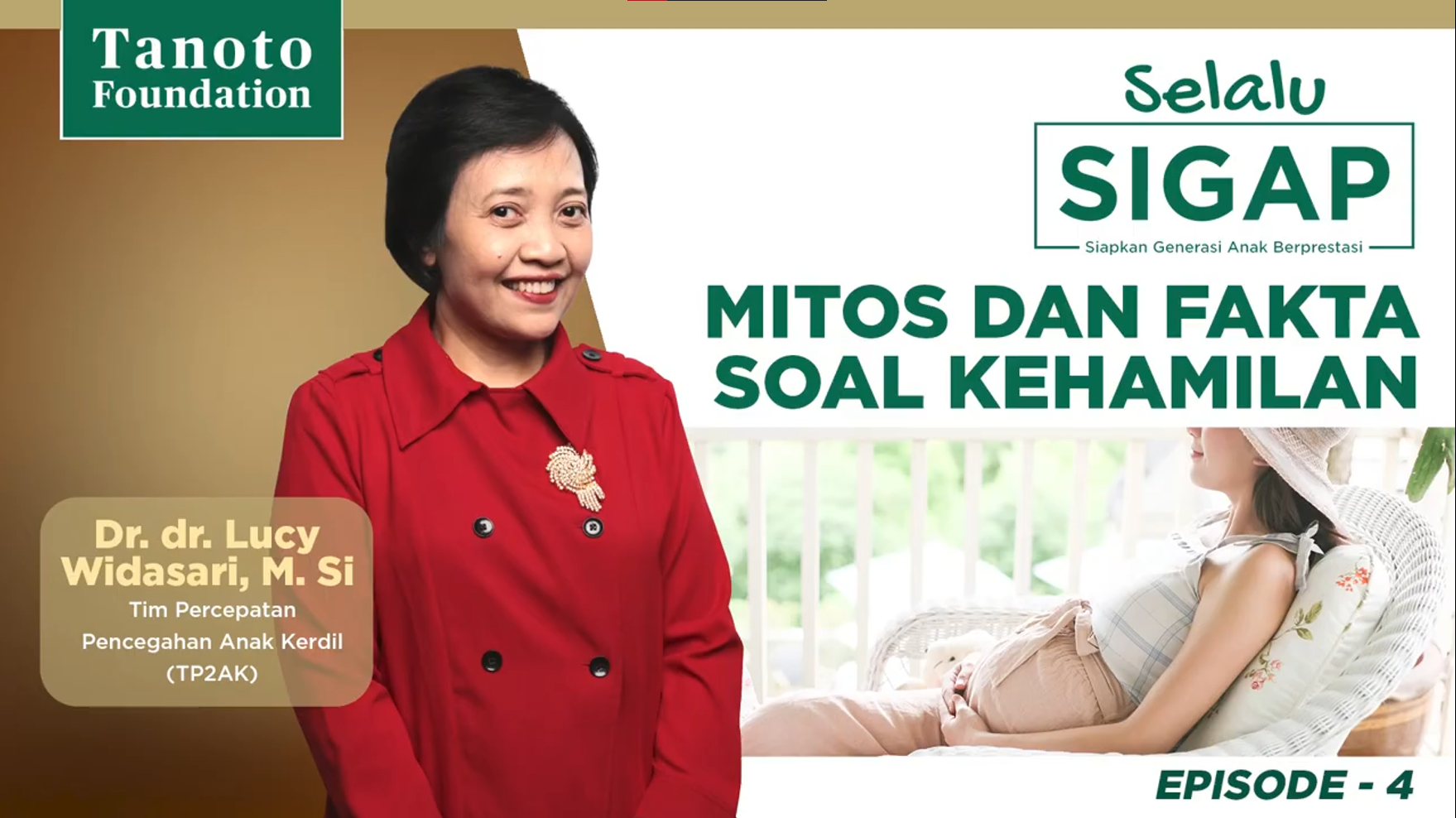Selalu SIGAP #4: Myths and Facts About Pregnancy

It seems like everyone has an opinion on pregnancy. And while generally well meaning, the advice is often contradictory, and sometimes flat out wrong.
Especially for first time parents, this can all add to the stress of pregnancy as you try to work out fact from fiction.
In the fourth episode of Selalu SIGAP, our host Jill Van Diest talks with Dr. dr. Lucy Widasari, M. Si, of the Acceleration Team of Stunting Prevention (TP2AK) about how to spot pregnancy myths and how you can be fully informed of the facts.
This episode covers:
a. Myths commonly found during pregnancy
b. The facts you need to know
c. How to verify the information you get
Works of Imagination
When you’re pregnant, you may find that suddenly everyone around you is a health expert who provide tips about what is and isn’t safe for you. But although they mean well, these advices can also be confusing, conflicting, or even wrong.
Dr. Lucy described the sheer number of pregnancy myths she found during the research she conducted on expectant mothers.
These myths can encompass foods and drinks to avoid, to whether or not you can have your hair colored while you’re pregnant.
Popular myths say that foods to avoid during pregnancy include crab, calamari, pineapple, and cucumber. Consuming crab, for instance, might cause the baby to have 11 fingers. Pineapple is considered dangerous as some believe it may cause miscarriage or bring on labor. Drinking iced water is also frowned upon, as some believe it can enlarge the baby’s head.
“As I mostly work in nutrition, I found so many myths in the sector, including that delivery should be aided by a witch doctor or respected figures in the community,” Dr. dr. Lucy said.
The Hard Truth
Having a healthy pregnancy requires eating a balanced diet to provide what the mother and the baby need.
Noting the pineapple myth, for instance, Dr. dr. Lucy said that eating one when you’re pregnant is perfectly fine, as long as you keep a healthy and balanced diet.
Another item people like to warn about is coffee. But far from being a myth, research shows that high levels of caffeine have been linked to pregnancy complications. Per Dr. dr. Lucy’s suggestion, expectant mothers can have one cup of coffee or around 100 miligram each day.
“Caffeinated drinks can have a diuretic effect, meaning it may cause someone to urinate more often than usual. Caffeine is also a stimulant, which means it can increase heart rate, and can reduce iron absorption. So I suggest expectant mothers to limit their caffeine intake. If possible, don’t drink coffee at all,” she said.
Another food source on the myth list is instant noodles, which some believe can be harmful to pregnant women and their growing babies. According to Dr. dr. Lucy, there is yet to be a proper recommendation on instant noodle consumption, but she suggested expectant mothers to limit the intake as it is high in sodium.
She said that although some brands have added micronutrients to their instant noodles as recommended by the World Health Organization, they still contain preservatives, flavor enhancers and food colors.
“If you really crave one, try to use just half the seasonings or make your own. Secondly, add meat, chicken or vegetables. And always remember that all ingredients must be fully cooked,” she said.
One of the things expectant mothers should avoid eating is raw or undercooked food, such as sushi and salad. Eating raw fish can expose your growing baby to bacteria such as salmonella and listeria that can lead to infections and can be potentially harmful. Furthermore, although fish or seafood is actually a great source of protein, it can contain high levels of mercury, which is toxic.
The same goes for vegetables. Though they are good sources of vitamins and minerals, expectant mothers need to be more wary as fresh salad can contain bacteria.
“Vegetables need to be properly cleaned and cooked,” said Dr. dr. Lucy. “Based on research, cooked vegetables only lose about 5 to 15 percent of vitamin C compared to fresh ones. So it’s no problem at all.”
Another common myth says that pregnant women should avoid getting hair treatments, such as dying or straightening. On this, Dr. dr. Lucy said that there are no studies on the effect of such treatments.
“But if you believe that doing something during pregnancy is unsafe, then you should avoid it altogether,” she said.
Filtering Information
With so much information coming from all around us, it can be difficult to know what the truth is.
Dr. dr. Lucy shared that it is a family’s duty to separate the facts from the myths, including during a pregnancy. For instance, try to get your news from reputable media companies and gather information that is grounded in medical science.
“Along with having the right knowledge, having a support system from the family and the presence of an obstetrician-gynecologist who provides the right information will help immensely,” she added.
She also emphasized the importance of going to the same doctor or prenatal care provider for examinations during pregnancy, for the sake of having a thorough medical record. That way, should you have any concern in any stage of your pregnancy, the doctor can help you in offering the related facts.
“Don’t hesitate to ask and consult your worries with a health practitioner,” Dr. dr. Lucy said.
Get to know more https://bit.ly/MitosdanFaktaSoalKehamilan

Leave a Reply